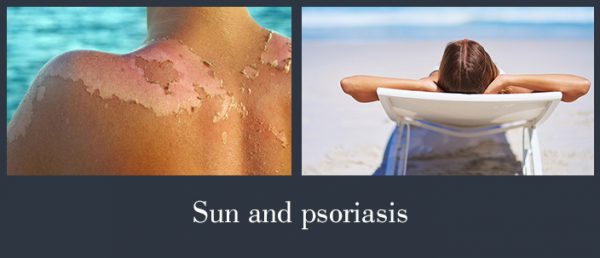Psoriasis usually retreats more quickly during the summer period. Most often, this is caused by beneficial effects of sea water, air and sun. In summer, the condition of patient’s skin noticeably improves since the influence of ultraviolet rays suppresses the development of pathological processes on the surface of the skin.
Recently, more and more attention is focused on close interrelation of psoriasis with the amount of vitamin D in the body. Everyone knows that vitamin D is given to children at an early age as a preventive measure against the development of rickets.
However, only few know that the lack of vitamin D in the blood of patients suffering from psoriasis (especially during cold season) contributes to progression of the disease.
Therefore, dermatologists recommend taking sun baths, since ultraviolet exposure promotes rapid regeneration of the skin with psoriatic plaques as well as healing open wounds.
However, we should remember that sunbathing should be dosed, which is why it is recommended to take sun baths at certain times in order to avoid the skin burn. Considering the fact that psoriasis belongs to a group of autoimmune diseases, whenever there is excessive sunburn, there is a risk of development of oncological skin diseases with premature aging of the skin.
It should be borne in mind that there are at least 5% of patients suffering from a photosensitive form of psoriasis. Most often, in such patients psoriasis is accompanied with simultaneous allergic skin lesions resulting from increased sensitivity in the sun. These patients, on the contrary, are recommended to protect themselves from sunlight.
The rules of sunbathing
People with psoriatic conditions should take sun baths only after consulting the attending physician. On the first day of the rest at the seaside, patient can spend no more than 10 minutes under the sun. Afterwards the duration of sunbathing on next days can be increased. However, the total time spent under the sun should not exceed half an hour.
While spending time at the sea, it is recommended to sunbath in the morning (5 – 11 A.M.) and in the afternoon (4 – 8 P.M.). The most dangerous time interval is between 12 – 14 p.m. At this time, the sun is most active, so whenever possible, you need to avoid direct sunlight. In addition, you can protect yourself from the sun with special protective creams and lotions.
The disadvantage of being in the open sun is the need to use sunscreen lotions and creams, as most external drugs include components that can exacerbate the symptoms of psoriasis. Additional components are able to interact with other drugs prescribed for treatment of psoriatic plaques.
Therefore, sunscreens should be selected by dermatologist, because many of them have side effects and require individual approach to the patient.
Useful properties of the sun in psoriasis
The sun rays have the following effects on the skin in psoriasis:
- ultraviolet has a slow destructive effect of the upper layer of the epidermis;
- the sun provokes the body to strengthen the defensive mechanisms;
- activates tissue regeneration;
- reduces peeling and the formation of psoriatic plaques;
- relieves itching
Sun beds contribute to thickening of the skin which increases the flow of oxygen into the lymph, followed by a prolonged remission.
The possibility of using tanning bed in psoriasis
Artificial ultraviolet is quite effective for treating psoriasis, especially in winter.
- UV procedure can be used in two forms:
- In this case, short-wave ultraviolet rays are used.
- This form uses long-wavelength radiation with natural photosensitizers (Psoralen).
Ultraviolet rays affect the skin increasing endorphin production (a hormone of happiness) which positively affects the central nervous system. The sun bed can remove acute symptoms of the lesions on the skin. Artificial tan makes the body produce vitamin D which neutralizes nervousness and stress.
Recommendations for using sun beds
First of all it should be taken into account that using sun beds as well as sunbathing cannot replace complex psoriasis treatment. Therefore, before taking these procedures, it is recommended to consult dermatologist.
The following conditions need to be met:
- you cannot use sun beds in the acute stage of the disease, since the body is weakened and has an increased sensitivity of the skin which can lead to skin burns;
- it is preferable to choose vertical solarium which is much more effective than horizontal one;
- it is recommended to stay there for no more than 6 minutes;
- it is best to visit solarium every other day;
- The course of treatment with the use of solarium should not exceed 25 sessions lasting 5-7 minutes.
It is important to consider that some medicinal and cosmetic preparations can cause acute allergic reactions, which might lead to increased sensitivity of the skin to solarium and the sun in the future. Therefore, before you visit the solarium, as well as before you go to the sea, it is best recommended to consult the attending physician.
Prevention
Despite its useful properties, ultraviolet rays can cause sunburn resulting in watery blisters on the skin, if not properly used. This condition leads to increased itching and harmful infections because of it. In addition, ultraviolet overdries the skin which leads to its premature aging and the formation of benign and malignant neoplasms.
It is important to remember that phototherapy, as well as all medical procedures, should be conducted only after consultation with the attending physician. Despite its harmlessness, it can cause negative manifestations on the skin.


